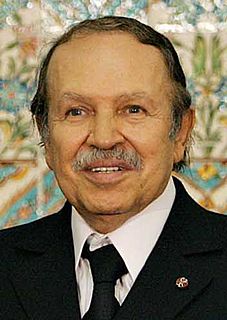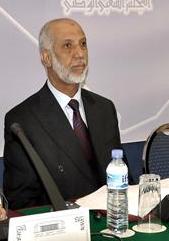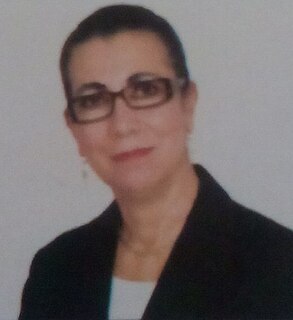
Elson Bakili Muluzi is a Malawian politician who was the first freely elected President of Malawi from 1994 to 2004. He was also chairman of the United Democratic Front (UDF) until 2009. He succeeded Hastings Kamuzu Banda as Malawi's president. He also served in Banda's cabinet as Minister without Portfolio, before retiring in 1980.

Ali Benflis is an Algerian politician who was Head of Government of Algeria from 2000 to 2003. In 2003, he became the general secretary of the National Liberation Front party. Benflis was a candidate in the 2004 presidential election, but the poll resulted in the re-election of Abdelaziz Bouteflika. Benflis ran yet again as an independent candidate in the 2014 Algerian presidential elections held on 17 April 2014. As a result, Abdelaziz Bouteflika was reelected as president with 81.53% of the votes, with Benflis ending as runner-up with 12.18%.

Presidential elections were held in Algeria on 8 April 2004. Incumbent President Abdelaziz Bouteflika was re-elected with 85% of the vote.

Abdelaziz Belkhadem is an Algerian politician who was Prime Minister of Algeria from 2006 to 2008. He was also Secretary-General of the National Liberation Front (FLN). Belkhadem served as Minister of Foreign Affairs from 2000 to 2005 and Personal Representative of President Abdelaziz Bouteflika from 2005 to 2006; after serving as Prime Minister from 2006 to 2008, he was again appointed as Personal Representative of the Head of State in 2008.

Algeria elects on national level a head of state - the president - and a legislature. The president is elected for a five-year term by the people. People's National Assembly has 462 members, elected for a five-year term in multi-seat constituencies by proportional representation. Eight seats in the national assembly are reserved for Algerians abroad. The Council of the Nation has 144 members, 96 members elected by communal councils and 48 members appointed by the president. Algeriawesh alors has a multi-party system, with numerous parties in which no one party often has a chance of gaining power alone, and parties must work with each other to form coalition governments. According to a US Embassy cable, the 2009 presidential elections were "carefully choreographed and heavily controlled", with the official turnout figure "exaggerated" by at least 45%.

A Mauritanian presidential election occurred on 11 March 2007. Since no candidate received a majority of the votes, a second round was held on 25 March between the top two candidates, Sidi Ould Cheikh Abdallahi and Ahmed Ould Daddah. Abdallahi won the second round with about 53% of the vote and took office in April.

Presidential elections were held in Mali on 29 April 2007. Incumbent president Amadou Toumani Touré ran for re-election against seven other candidates and won in the first round with about 71% of the vote.

A presidential election was held in Senegal on 25 February 2007. The incumbent president, Abdoulaye Wade, who was first elected in 2000, won the election in the first round with almost 56% of the vote.

The 2002 Algerian Legislative election was held in Algeria on 30 May 2002 to elect members of the People's National Assembly. The governing National Liberation Front (FLN) won a majority of seats in the election. The election suffered from a low turnout, violence and boycotts by some opposition parties.

General elections were held in Malawi on 19 May 2009. Incumbent President Bingu wa Mutharika ran for re-election; his main opponent was John Tembo, the president of the Malawi Congress Party (MCP). Five other candidates also ran. The election was won by Mutharika, who was re-elected to the Presidency with around two-thirds of the vote. Mutharika's DPP also won a strong parliamentary majority.

The 1999 Algerian presidential election took place on 15 April 1999 to elect the President of Algeria. Abdelaziz Bouteflika was elected with 73.8% of the vote after the other six candidates withdrew on the eve of the election.

A presidential election was held in the Republic of the Congo on 12 July 2009. Long-time President Denis Sassou Nguesso won another seven-year term with a large majority of the vote, but the election was marked by accusations of irregularities and fraud from the opposition; six opposition candidates chose to boycott the election.

General elections to elect the president, Assembly of the Republic, and Provincial Assemblies was held in Mozambique on 28 October 2009. Incumbent President Armando Guebuza ran for re-election as the FRELIMO candidate; he was challenged by opposition leader Afonso Dhlakama, who had stood as the RENAMO candidate in every presidential election since 1994. Also standing were Daviz Simango, the Mayor of Beira, who was a RENAMO member before founding his own party, the Democratic Movement of Mozambique (MDM), earlier in 2009.

Presidential elections were held in Guinea-Bissau on 28 June 2009 following the assassination of President João Bernardo Vieira on 2 March 2009. As no candidate won a majority in the first round, a second round was held on 26 July 2009 between the two leading candidates, Malam Bacai Sanhá of the governing African Party for the Independence of Guinea and Cape Verde (PAIGC) and opposition leader Kumba Ialá. Sanhá won with a substantial majority in the second round, according to official results.

A legislative election was held in Algeria on 10 May 2012. The incumbent coalition, consisting of the FLN of President Abdelaziz Bouteflika and the RND of Prime Minister Ahmed Ouyahia, held on to power after winning a majority of seats. The Islamist parties of the Green Algeria Alliance lost seats.

Presidential elections were held in Algeria on 17 April 2014. Incumbent President Abdelaziz Bouteflika was re-elected with 82% of the vote. Issues in the campaign included a desire for domestic stability after the bloody civil war of the 1990s, the state of the economy, the frail health of the 15 year incumbent and 77-year-old president whose speech was "slurred and inaudible" in his only public outing during the campaign, and the less-than-wholehearted support given the president by normally united and discrete ruling class.

Presidential elections are scheduled to be held in Algeria on 18 April 2019.























